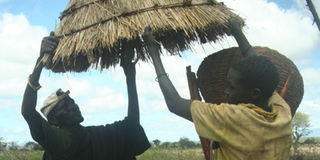A cattle keeper ventures into bee-keeping to make money from honey

Lokirimong and another checks on a traditional bee hive. PHOTOS BY BRIAN SSENOGA
What you need to know:
Gabriel Lokirimong naturally followed in the footsteps of his forefathers’ tradition of keeping cattle. Though he knew about bees and how to get honey, he did not know it could also earn him money
I am Gabriel Lokirimong, 35, a member of the Kacheri Bee Keepers Association in Kacheri Sub county, Kotido District. Though I have known nomadic cattle keeping as the only source of money, I started keeping bees in 2003 when I realised that there are a lot of wild bees in the area, so I made two hives which were soon colonised [the process by which bees come to the hive] and since then I have never run out of honey.
However, the business was struggling and on several occasions my hives would be stolen. Also, a number of times, bees would migrate. Furtherstill, I was not doing it as a business but as a hobby.
Techniques and ways
Last year, our group through the Jie Community Animal Health Workers Association (Jichawa), an NGO, heard about the national honey week, which was held in Kampala.
Our chairman Lobee Marionok, represented us at the event, he came back and told us that there is indeed money to be made in beekeeping. He taught all of us, the 30 members the different beekeeping techniques and showed the various ways we can gain from the activity. He talked about companies which trade in bee products, some selling hives, other making soap and candles.
I got encouraged and angry at the same time. Encouraged that our group could also do it but angry that we had always kept bees as insects that only provide honey for household consumption without even thinking about the monetary value.
With the support of some organisations we are now learning to integrate beekeeping with cattle rearing. Though, this seems to be a new phenomenon for many Karimojong, but we have been taught at the agro-pastoral field school, that keeping bees has much quicker returns yet one puts in little time and start up capital.
We are also taught the socio-economic value of bees plus environmental conservation, most of these things like beekeeping for economic strengthening and environmental conservation we did not know.
For instance, all you need is a well constructed, well situated, properly managed bee hive and the bees will do the rest of the work.
Currently, I have seven local hives colonised in only one month and 10 modern hives commonly known as KTB (Kenya Top Bar).
The KTBs are a donation from MAP, a local NGO. Though most of them are yet to be colonised by bees, I hope that I will get a bigger harvest in case they are. Some of our group members have about 20 hives. They harvest big and get more money.
The bee hives are placed either under a tamarind or Gum Arabic tree, which are known to attract bees. During the season, I also sell tamarind fruits to supplement my income alongside cattle keeping.
Huge potential
Recently a team from Tunado, the organisers of the honey week, and the ministry of agriculture visited, told us about the potential of the area to produce more honey than there is today, and the demand. In fact, one of them (visitors) said each farmer can produce at least 100 kgs.
However, despite the huge potential for large-scale honey production, the benefits of apiculture for the region are yet to out weigh the challenges facing the practice ranging from natural to artificial.
Save for the arid weather conditions, which do not support all year growth of forage, we still have low colony rate. And the thieves who often steal already colonised hives for honey, For instance, all seven of Marionok’s hives were recently stolen at a time when they were due for harvest.
Most farmers in the area lack enough knowledge about modern methods of bee keeping for commercial purposes. I think that needs urgent attention.
In 2012, we harvested about 20 twenty-litre jerry cans but much of it had a lot of dead bees in it. We could not get much out of it; even the buyers could not give us the money we wanted because they had to process it several times.
Since then, we have been received trainings not only about integrating cattle rearing with beekeeping hoping for better results.
The trainings are conducted at Nakapeliyang agro-pastoral farmer field school. It is through such that the group recently managed to harvest over 200 Kgs and we sold it to Jichawa.




